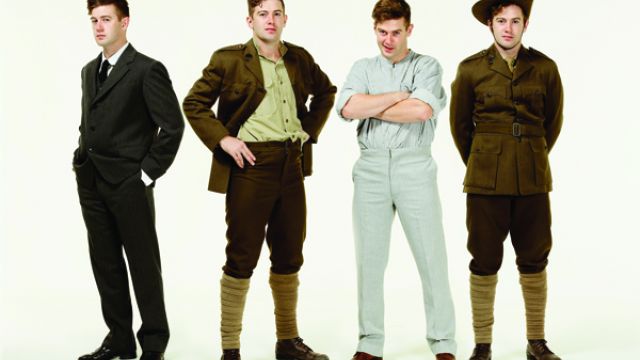Patient 12
Patient 12, a play about the casualties of ‘The Great War’,opened on Anzac Day. It’s unlikely this was by chance. Crowded into the tiny Courthouse theatre, the audience could scarcely have been more aware of the play’s context. The debate over what exactly was being either celebrated or mourned. Sacrifice versus waste. Patriotism versus useless slaughter. For the Empire? For Capital? For freedom? All these arguments, beliefs and positions are represented and examined in Patient 12.
Caulfield (Melbourne) Rehabilitation Hospital, 1916. An unidentified, perhaps unidentifiable soldier, grievously wounded in France, lies comatose, beyond recovery, but somehow refusing to die. He has the letter ‘D’ tattooed on his chest. Medical officer Dr Thomas writes to people whose son or fiancé is missing in action, hoping – perhaps out of a sense of duty – to identify ‘Patient 12’. Such is the device Kevin Summers employs to bring to the hospital a respectable lawyer and his wife, a proud ‘Wobbly’ miner, and a bar maid – all of whom bring with them, of course, their losses, their grief and their take on the war.
Patient 12 could, in fact, be anybody, another poor bastard blown to pieces at the front, but he might be James, the upper middle-class couple’s son. James could have been an officer, but as an ‘egalitarian’, he enlisted as a private. To the very end, his mother determinedly believes that faceless being in the bed is her James. But he could also be Andy, the miner’s son, a lad his father begged not to go and fight the capitalists’ war. He could be Freddie, the boisterous fiancé of the barmaid. And then there is Percy, patient at the hospital, diagnosed with this new thing called ‘shell shock’; he resolutely believes Patient 12 is his best mate Leo – and he sneaks into the ward at night to talk with him.
We meet Andy, Leo and Freddie – but not, mysteriously, James – in flashbacks – and Will Ewing conveys all three with beautifully judged clarity, aided only by minimal changes in his army uniform. Mr Ewing takes his sparse opportunities to give us three distinct blokes – one riled by women giving him white feathers, one on the eve of battle, close to, even loving his mate Percy, and one ebullient Italo-Australian with total conviction that he’ll be back and so wanting his girl to let him have her before he goes.
This is a production that looks just right. It’s La Mama, so resources are minimal, but not only are Sophie Woodward’s costumes exactly evocative of character (except perhaps Percy’s too tight pants) and Bronwyn Pringle’s lighting very effective, the cast are immediately identifiable as the ‘types’ they represent. Dennis Coard is outstanding as the Wobbly miner – grim, unapologetic but deeply emotional. Jenny Seedsman has great presence, which strengthens her character’s stubbornly held delusions, and Colin MacPherson as her lawyer husband is exactly right as a respectable, buttoned-up mediocrity keeping his grief under control and his doubts at bay. Heidi Valkenburg, as the barmaid, conveys sweetness and naiveté, but needs to find the technique that enables the delivery of high emotion without compromising diction and comprehensibility. As the disillusioned and near alcoholic Doctor Thomas, Jason Buckley, and as shell-shocked Percy, Joel Parnis (an experienced music theatre performer), perhaps need to realize that ‘intensity’ and ‘significant pauses’ don’t always constitute the emotions that reach an audience.
We get to know most of these characters via letters written to James or Andy or Freddie, exposition that might have been better integrated into dramatic scenes. Instead, spot lit actors must address the air and then somehow get off with a lighting change before dialogue scenes can resume. Director Don Mackay is stuck with this, but makes the most of the Courthouse’s near bare stage and no wings, as such. It takes too long (in this 90 minute, no interval show) before there is much character to character conflict and perhaps because there is no real developing narrative (it’s a situation, not a story, despite a time span of years), the show seems to have several endings.
The play’s promising premise does not, then, develop very far and devolves into attitudinizing – or the clash of somewhat predictable attitudes in a representation of views political and personal of the time. It’s possible Mr Summers has ‘covered’ too much at the expense of dramatic conflict. If you’ve ever had any interest in WWI and its causes and consequences, or indeed ‘war’ in general, you won’t hear anything new, but Patient 12 is nevertheless pointed, poignant and relevant to today.
Michael Brindley
Subscribe to our E-Newsletter, buy our latest print edition or find a Performing Arts book at Book Nook.

